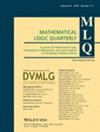The power set and the set of permutations with finitely many non-fixed points of a set
IF 0.4
4区 数学
Q4 LOGIC
引用次数: 3
Abstract
For a cardinal , we write for the cardinality of the set of permutations with finitely many non-fixed points of a set which is of cardinality . We investigate the relationships between and for an arbitrary infinite cardinal in (without the axiom of choice). It is proved in that for all infinite cardinals , and we show that this is the best possible result.
幂集和集的具有有限多个不动点的置换集
对于基数$\mathfrak{a}$,我们写S fin(a)$\运算符名称{\mathcal{S}_{\text{fin}}(\mathfrak{a})$为基数为a$\mathfrak{a}$的集合的具有有限多个非不动点的置换集的基数。我们研究了2a$2^\mathfrak{a}$与S fin之间的关系(a)$\运算符名称{\mathcal{S}_{\text{fin}}(\mathfrak{a})$,用于ZF$\mathsf{ZF}$中的任意无限基数a$\mathfrak{a}$(没有选择公理)。在ZF$\mathsf{ZF}$中证明了2a≠S fin(a)$2^\mathfrak{a}\ ne \ operator name{\mathcal{S}_{\text{fin}}(\mathfrak{a})$对于所有无限基数a$\mathfrak{a}$,我们证明这是最好的可能结果。
本文章由计算机程序翻译,如有差异,请以英文原文为准。
求助全文
约1分钟内获得全文
求助全文
来源期刊
CiteScore
0.60
自引率
0.00%
发文量
49
审稿时长
>12 weeks
期刊介绍:
Mathematical Logic Quarterly publishes original contributions on mathematical logic and foundations of mathematics and related areas, such as general logic, model theory, recursion theory, set theory, proof theory and constructive mathematics, algebraic logic, nonstandard models, and logical aspects of theoretical computer science.

 求助内容:
求助内容: 应助结果提醒方式:
应助结果提醒方式:


